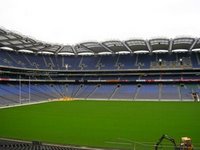Pay for Play: Has the Horse Bolted?

GAA director-general Liam Mulvihill, in his annual report yesterday, splashed his own bucket of cold water on the igniting debate on professionalism within the organisation's elite playing echelons. Mulvihill is the latest GAA bigwig to attempt to quell the increasingly testy argument about whether the best gaelic sportsmen should receive some reward for their considerable efforts. As the association's permanent Sir Humphrey, in contrast to elected Jim Hackers like Sean Kelly, Mulvihill's words carry some gravity. But have gaelic games already started down an irreversible path to professionalism?
The anti-professionalism rhetoric which has issued forth from within the GAA of late is as a result of the increasing militancy of the Gaelic Players Association. The GPA is currently campaigning strongly for the introduction of a grant system for elite players. On the face of it, this would hardly seem to be a measure worthy of revulsion for the GAA top brass. The grants would represent an equivalent of the tax breaks which other elite sportspeople enjoy and the funds would not come from GAA coffers, rather would be awarded by the Sports Council. They would also be in the form of fixed, and not astronomical, amounts. The GPA have been displeased with the GAA's lack of support on this issue, however outgoing president Kelly has stated that it is an issue which he feels should be addressed by Nicky Brennan, his successor, rather than the new man being handed a fait accompli.
But it is clear from the the GAA's recent crankiness that they possess a deep suspicion of the GPA's motives, and obviously regard the grants issue as a kind of stalking horse for professionalism - the thin end of the wedge, if you will. For the GAA - aside from the purely fiscal argument that the organisation could not support a professional game, and that the direction of revenues into top players' pockets would grievously damage the grassroots - there is a deeper, philosophical problem.
They feel that the creation of a defined elite - paid, privileged and elevated above the workaday grunts of the association's rank and file - would irreparably damage the fabric of an organisation whose brightest lights are theoretically of the same standing as its lowliest plodders. Those who hold the GAA dear revel in the fact that the guy who can score the winning point in a big championship match in front of 50,000 people on a Sunday can be found the following day teaching maths or fixing cars or selling double-glazing or in college lectures even, sitting alongside - and no better or worthier than - the guy who wheezes through training laps with the junior Bs.
The same fellow takes leave of his county team-mates after returning from a championship match which has been broadcast on national television and meets up with his local club-mates to prepare for the following week's clash with the arch-rivals from the next parish.
These are the things which have made the GAA what it is today and represent an ethos which has constructed a miraculously resilient and hugely popular amateur super-structure. It does not take a student of politics to see the parallels with Soviet socialist theory - and it does not take a student of history to see how it could be similarly derailed. The realities of human society, and the inability of the theory to cope with the practicality of greed, ambition and market forces did for communism, and the GAA could be finding that its lofty principles cannot survive the rigours of a modern Irish society whose values are as far from utopian socialism as you can get.
The notion of some being more equal than others is clearly already alive in the GAA. The quasi-professionalism of top county players means that they are, by definition, operating at a different level to most ordinary club players. The exponential rise in the association's commercial activities and the enduring popularity of the games means that the idea of there being a bountiful pie which top players eyes can view covetously is inevitable.
Furthermore, the players - now organised through the GPA - are confident enough to whisper threats of strike action (should they not be listened to over the grants issue), a weapon which has already been tested successfully by the Cork hurlers in 2002.
The players are not the only ones who are increasing their commitment. The desire for success at inter-county level has led to an alarming increase in county boards' expenditure on training and preparing county panels. As Mulvihill mentioned yesterday, up to twelve counties operated at a loss in 2005, a situation which Croke Park is understandably aggrieved about. Wealthy private donors are frequently revealed as having funded county teams and the concept of pure amateurism is made redundant in the way a lot of this increased expenditure finds its way into the wallets of managers and, indeed, players.
The sense of increasing pressure on the traditional values of the GAA is unavoidable. The seriousness with which the games are taken at the top level means that the commercial and sporting imperatives are competing against the association's principles, in a struggle that, even at this stage, looks dangerously one-sided. Liam Mulvihill and the GAA's leading adminstrators are right to fear for the organisation as we know it, as the pull of Mammon appears to be dragging it away from its perennial ideals. The GAA has dabbled with these forces until now with much success and financial reward. They may now be finding that the association's very soul is the price which the market demands in return.
You get the feeling that it is a little late to be closing the stable door.






0 Comments:
Post a Comment
<< Home